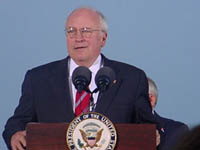Cheney assures the world that Russia will not become enemy of America
On Thursday the international conference “A Joint Vision for Common Neighbours” began its work in Vilnius. Presidents of 9 states from the Baltic and Black Sea regions are developing this “joint vision”: from Lithuania, Poland, Moldova, Romania, Georgia, Ukraine, Bulgaria, Latvia and Estonia. Plus special guest “stars” are there – US Vice President Dick Cheney and the European Union commissioner for joint foreign and security policy Javier Solano.

Recently “forums” and “conferences” such as this one have been taking place with enviable regularity. In December last year the “Association of Democratic Choice” gathered in Kyiv. Practically the same people took part as in the current conference, although the Poles did not come then.
As expected, some politicians used the forum to share their burning issues, of which one was Russia. Georgia’s President Mikhail Saakashvili confirmed that Tbilisi is examining the possibility of withdrawing from the CIS. At the same time the polite head of the Caucasian state did not fail to compliment his hosts: “The example set by Lithuania shows that if Tbilisi leaves the CIS, it will not just disappear”.
Mikhail Saakashvili is especially insulted by the visa regime with Russia. “ Georgia has signed a bilateral agreement on free trade and a visaless regime with many CIS countries, but our most stringent visa regime is with Russia, the main country in the CIS, much stricter than with EU states.”
His Ukrainian colleague Viktor Yushchenko, on the other hand, did not address any complaints towards Russia – at least publicly that is. The Ukrainian president has other ills which he shared with the conference. According to Yushchenko, it is difficult for Ukraine to remain in a state of suspense, not having any clear guarantees from the European Union regarding possible entry into the EU. At the same time he is sure that the Ukrainian people chose their path in 2004, that of integration into the European community.
But it was not Saakashvili and Yushchenko who distinguished themselves most of all, but rather US Vice-President Dick Cheney. George Bush’s deputy gave a lengthy lecture at the forum directed at Russia. The key moment in the vice-president’s speech was the phrase, “ Russia must”.
According to Cheney, Russia must make the choice in favour of the further development of democracy in their country: “The USA and the whole of Europe want Russia to be a healthy democracy, but the current opponents of Russian democracy are trying to undo what has been gained in recent decades in many spheres of civil society, starting with religion and ending with the media and political parties”.
The American vice-president practically listed the points which really do not suit the USA. Here there was support for “the last dictatorship in Europe ” (meaning Aleksandr Lukashenko), “the unjust and wrong restriction of human rights” (such as in the press and with non-governmentalandreligious organizations etc) and using its energy potential to apply pressure on its neighbours. His last point deserves to be quoted: “No lawful interests can be pursued when oil and gas become instruments of intimidation and blackmail in order to manipulate supplies and monopolize transit routes”. The man from Halliburton knows what he is talking about, of course…
But Cheney finished on a more positive note. “No one believes that Russia is destined to be an enemy,” he told the conference. The participants did not resolve to contradict the US vice-president.
It is worth noting that in the last few days the American leadership has really shown concern over the problems of Russia’s relations with neighbouring states. A day earlier US Secretary of State Condoleezza Rice called on Moscow to respect Washington’s interests in post-Soviet countries. “Russians must accept that we have our own relations with their neighbours, even if these countries were once part of the Soviet Union ,” she said. “I know this is sometimes difficult to do. Sometimes suspicions arise over our relations, for example with Ukraine .”
But if Condoleezza Rice’s words did not arouse any emotion in Moscow , then Dick Cheney did manage to make an impression (in general, he manages to do this quite often – irrespective of what topic he is commenting on).
“It is hard to relate what Dick Cheney said with the many real political processes which we can observe today in the post-Soviet sphere,” the Chairman of the State Duma commission on CIS affairs and relations with fellow nationals Andrey Kokoshin told Interfax.
“The United States now has to deal with a totally different Russia – with a Russia which has recovered its actual sovereignty in many areas and is following a course on the world stage which above all meets its own national interests,” he said.
According to him, it is absolutely impossible to agree with Cheney’s comments that in a whole series of countries bordering Russia, but primarily the current administration is referring to Ukraine and Georgia, an active process of democratization is taking place and that these countries have supposedly made significant progress in this field.
“Both in Ukraine andGeorgia business and politics remain exceptionally intertwined; there remains a high level of corruption, repression of the opposition, which the victors in the “Orange Revolution” demonstrated immediately after coming to power. There is a whole array of other negative events,” remarked Kokoshin.
However, these are precisely the kind of comments which we have come to expect from the American vice-president. In Washington he is seen as one of the supporters of a tough course with regard to Russia. Therefore his saying that “ Russia will not become our enemy” can even be viewed as diplomatic. Using a certain amount of imagination, of course.
Oleg Artyukov for Pravda.Ru
Translated by James Platt
Subscribe to Pravda.Ru Telegram channel, Facebook, RSS!


